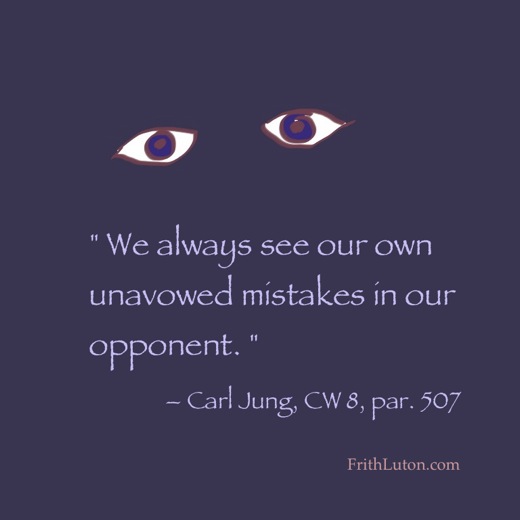3 Steps to Work Through Projection
September 26, 2018
Categories: Projection
Projection is a defense mechanism we use to deal with the parts of ourselves that we don’t like. When we engage in projection, we take unacceptable parts of ourselves, and “project” them on to someone else.
Projection often shows up as judging someone harshly. Our reaction doesn’t “fit the crime.”
Projection Can Be Dangerous
Projection can be dangerous for two reasons. First, when we engage in projection, we fail to notice the troublesome parts of ourselves, so we can’t deal with these parts. In other words, projection limits our growth. Second, when we engage in projection, we risk damaging the relationship with the person whom we judge. There are often relational consequences to our projection.
3 Steps to Work Through Projection
So how can we move forward? How can we avoid the consequences of our projection, and perhaps even use projection to our advantage? Here are 3 steps to keep in mind:
- Become aware of when you might be projecting. The first step for dealing with projection is to become aware of it when it is occurring. What are the signs that projection might be happening? The key is to pay attention to when you have a strong reaction. Whenever you find yourself being triggered by something, press the pause button. Does the level of your reaction match the situation? Would an “average person” react the same way? If not, it’s a good sign that projection might be happening.
- Get clear on the judgment. The next step is to clarify what your judgment is about. Sometimes we have a reaction, but we aren’t sure why. Spend some time and think about what your judgment is about. What is bothering you about the person you are judging? Can you narrow it down to one statement? For example, “You’re a [fill in the blank]?” Don’t hold back or modify your judgment to make it more “acceptable.” This is just an exercise for your own personal growth.
- How is the judgment true about you? I like to say that a judgment may or may not be true about the person you are judging, but it is almost certainly true about you. If it had nothing to do with you, you wouldn’t be triggered. You wouldn’t have an emotional reaction. Spend some time thinking about how the judgment might be true about you. This is the key learning piece. If you stick with it, you might recognize something about yourself that you hadn’t realized before. This can be an important area for future healing and growth.
Action Step: The next time you find yourself getting triggered and making a judgment about someone, look out for projection. Walk through the 3 steps and see if you might learn something new about yourself.

Related Thoughts

Subscribe To My Newsletter
Join my mailing list to receive the latest blog posts.
Receive my e-book “The Mental Health Toolkit” for free when you subscribe.



